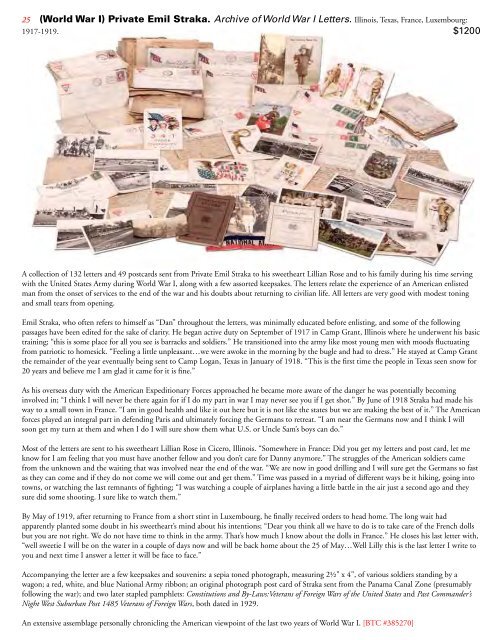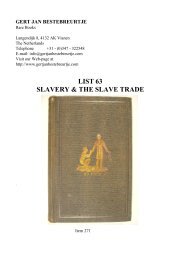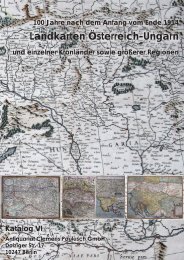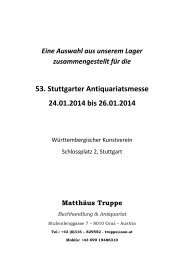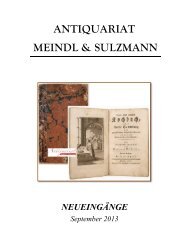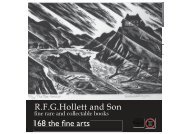Archives & Manuscripts #14 - International League of Antiquarian ...
Archives & Manuscripts #14 - International League of Antiquarian ...
Archives & Manuscripts #14 - International League of Antiquarian ...
Create successful ePaper yourself
Turn your PDF publications into a flip-book with our unique Google optimized e-Paper software.
25 (World War I) Private Emil Straka. Archive <strong>of</strong> World War I Letters. Illinois, Texas, France, Luxembourg:<br />
1917-1919. $1200<br />
A collection <strong>of</strong> 132 letters and 49 postcards sent from Private Emil Straka to his sweetheart Lillian Rose and to his family during his time serving<br />
with the United States Army during World War I, along with a few assorted keepsakes. The letters relate the experience <strong>of</strong> an American enlisted<br />
man from the onset <strong>of</strong> services to the end <strong>of</strong> the war and his doubts about returning to civilian life. All letters are very good with modest toning<br />
and small tears from opening.<br />
Emil Straka, who <strong>of</strong>ten refers to himself as “Dan” throughout the letters, was minimally educated before enlisting, and some <strong>of</strong> the following<br />
passages have been edited for the sake <strong>of</strong> clarity. He began active duty on September <strong>of</strong> 1917 in Camp Grant, Illinois where he underwent his basic<br />
training; “this is some place for all you see is barracks and soldiers.” He transitioned into the army like most young men with moods fluctuating<br />
from patriotic to homesick. “Feeling a little unpleasant…we were awoke in the morning by the bugle and had to dress.” He stayed at Camp Grant<br />
the remainder <strong>of</strong> the year eventually being sent to Camp Logan, Texas in January <strong>of</strong> 1918. “This is the first time the people in Texas seen snow for<br />
20 years and believe me I am glad it came for it is fine.”<br />
As his overseas duty with the American Expeditionary Forces approached he became more aware <strong>of</strong> the danger he was potentially becoming<br />
involved in; “I think I will never be there again for if I do my part in war I may never see you if I get shot.” By June <strong>of</strong> 1918 Straka had made his<br />
way to a small town in France. “I am in good health and like it out here but it is not like the states but we are making the best <strong>of</strong> it.” The American<br />
forces played an integral part in defending Paris and ultimately forcing the Germans to retreat. “I am near the Germans now and I think I will<br />
soon get my turn at them and when I do I will sure show them what U.S. or Uncle Sam’s boys can do.”<br />
Most <strong>of</strong> the letters are sent to his sweetheart Lillian Rose in Cicero, Illinois. “Somewhere in France: Did you get my letters and post card, let me<br />
know for I am feeling that you must have another fellow and you don’t care for Danny anymore.” The struggles <strong>of</strong> the American soldiers came<br />
from the unknown and the waiting that was involved near the end <strong>of</strong> the war. “We are now in good drilling and I will sure get the Germans so fast<br />
as they can come and if they do not come we will come out and get them.” Time was passed in a myriad <strong>of</strong> different ways be it hiking, going into<br />
towns, or watching the last remnants <strong>of</strong> fighting; “I was watching a couple <strong>of</strong> airplanes having a little battle in the air just a second ago and they<br />
sure did some shooting. I sure like to watch them.”<br />
By May <strong>of</strong> 1919, after returning to France from a short stint in Luxembourg, he finally received orders to head home. The long wait had<br />
apparently planted some doubt in his sweetheart’s mind about his intentions; “Dear you think all we have to do is to take care <strong>of</strong> the French dolls<br />
but you are not right. We do not have time to think in the army. That’s how much I know about the dolls in France.” He closes his last letter with,<br />
“well sweetie I will be on the water in a couple <strong>of</strong> days now and will be back home about the 25 <strong>of</strong> May…Well Lilly this is the last letter I write to<br />
you and next time I answer a letter it will be face to face.”<br />
Accompanying the letter are a few keepsakes and souvenirs: a sepia toned photograph, measuring 2½" x 4", <strong>of</strong> various soldiers standing by a<br />
wagon; a red, white, and blue National Army ribbon; an original photograph post card <strong>of</strong> Straka sent from the Panama Canal Zone (presumably<br />
following the war); and two later stapled pamphlets: Constitutions and By-Laws:Veterans <strong>of</strong> Foreign Wars <strong>of</strong> the United States and Past Commander’s<br />
Night West Suburban Post 1485 Veterans <strong>of</strong> Foreign Wars, both dated in 1929.<br />
An extensive assemblage personally chronicling the American viewpoint <strong>of</strong> the last two years <strong>of</strong> World War I. [BTC #385270]


